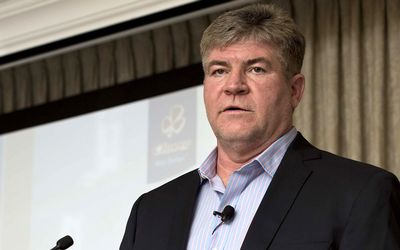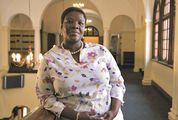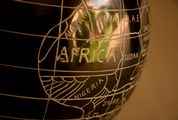DAIRY products and beverages group Clover has become the second South African company this year to shelve its Nigerian expansion plans due to stringent import-regulation and foreign exchange controls that have made operating in Africa’s largest economy difficult.
Plans to invest in Angola, the continent’s second-largest producer of oil after Nigeria, would also be put on hold until the situation in the African economies improved, Clover CEO Johann Vorster said. Until then, Clover was to export its products to Nigeria on a cash basis only.
The continent’s largest dairy producer has for several years sold its milk, cream cheese and butter products across Africa from the tills of grocers including Shoprite and Massmart. Its products are sold in 16 countries outside SA, but it only owns distribution centres in Botswana, Lesotho, Swaziland and Namibia.
Since listing on the JSE in 2010, the company has repeatedly stated its intention to build production and distribution plants in West Africa to better exploit the growth potential those economies offered before they were hit by the downturn in the oil price.
"It’s terrible there," Mr Vorster said on Wednesday, in reference to the current operating environment in Nigeria.
"We were not able to access currency. We could not buy milk. Packaging was difficult."
The debate among Clover’s executives was whether the company had "dragged its feet" and "lost an opportunity" by not setting up a production facility sooner, as the Nigerian government had been seen to assist foreign companies get established there with access to currency. On the other hand, "maybe we got off lucky by delaying", Mr Vorster said.
In January, fashion retailer Truworths shut two of its remaining stores in Nigeria. This came when government intervention to inflate the value of the naira by artificially pegging it to the dollar, halting foreign currency supply and setting trade limits in the interbank market, weighed on operating costs.
In December, Resilient iced its plans to build 10 shopping malls in the continent’s most populated economy as the risks outweighed the returns. Other South African companies to withdraw or slow the pace of expansion included Woolworths, Tiger Brands and Telkom.
Apart from the operating blips in Nigeria, which contributed less than 1% to net profit, analysts said Clover’s performance in the six months to December was fair. The company reported a 4% increase in net profit to R218m in the six months to December, despite the national milk surplus lowering the income it received from fresh produce. Lower income from fresh-milk products during the period was more than offset by stronger sales in long-life milk, liquid custards and yoghurts.
The termination of Clover’s agreement with Danone last year and acquisitions of Dairybelle and Nkunzi Milkyway had increased its market share in the high-margin dessert area from zero to 28.8% in the past six months. Further expansion in this area will be pursued. The company is spending R35m to extend its yoghurt-production plant in Bloemfontein.

DELAY: Clover CEO Johann Vorster says the group will be exporting products to Nigeria on a cash basis only. Picture: MARTIN RHODES
DAIRY products and beverages group Clover has become the second South African company this year to shelve its Nigerian expansion plans due to stringent import-regulation and foreign exchange controls that have made operating in Africa’s largest economy difficult.
Plans to invest in Angola, the continent’s second-largest producer of oil after Nigeria, would also be put on hold until the situation in the African economies improved, Clover CEO Johann Vorster said. Until then, Clover was to export its products to Nigeria on a cash basis only.
The continent’s largest dairy producer has for several years sold its milk, cream cheese and butter products across Africa from the tills of grocers including Shoprite and Massmart. Its products are sold in 16 countries outside SA, but it only owns distribution centres in Botswana, Lesotho, Swaziland and Namibia.
Since listing on the JSE in 2010, the company has repeatedly stated its intention to build production and distribution plants in West Africa to better exploit the growth potential those economies offered before they were hit by the downturn in the oil price.
"It’s terrible there," Mr Vorster said on Wednesday, in reference to the current operating environment in Nigeria.
"We were not able to access currency. We could not buy milk. Packaging was difficult."
The debate among Clover’s executives was whether the company had "dragged its feet" and "lost an opportunity" by not setting up a production facility sooner, as the Nigerian government had been seen to assist foreign companies get established there with access to currency. On the other hand, "maybe we got off lucky by delaying", Mr Vorster said.
In January, fashion retailer Truworths shut two of its remaining stores in Nigeria. This came when government intervention to inflate the value of the naira by artificially pegging it to the dollar, halting foreign currency supply and setting trade limits in the interbank market, weighed on operating costs.
In December, Resilient iced its plans to build 10 shopping malls in the continent’s most populated economy as the risks outweighed the returns. Other South African companies to withdraw or slow the pace of expansion included Woolworths, Tiger Brands and Telkom.
Apart from the operating blips in Nigeria, which contributed less than 1% to net profit, analysts said Clover’s performance in the six months to December was fair. The company reported a 4% increase in net profit to R218m in the six months to December, despite the national milk surplus lowering the income it received from fresh produce. Lower income from fresh-milk products during the period was more than offset by stronger sales in long-life milk, liquid custards and yoghurts.
The termination of Clover’s agreement with Danone last year and acquisitions of Dairybelle and Nkunzi Milkyway had increased its market share in the high-margin dessert area from zero to 28.8% in the past six months. Further expansion in this area will be pursued. The company is spending R35m to extend its yoghurt-production plant in Bloemfontein.






















Change: 0.83%
Change: 0.93%
Change: 0.95%
Change: 0.73%
Change: 1.91%
Data supplied by Profile Data
Change: 0.58%
Change: 0.63%
Change: 0.83%
Change: 0.00%
Change: 0.62%
Data supplied by Profile Data
Change: -1.42%
Change: -0.81%
Change: -0.64%
Change: -1.07%
Change: -0.24%
Data supplied by Profile Data
Change: 2.15%
Change: 2.41%
Change: 2.30%
Change: 2.47%
Change: 2.88%
Data supplied by Profile Data